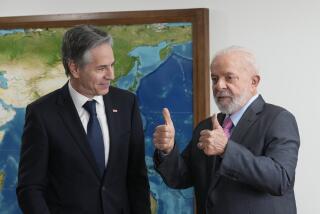Brazil’s Nuclear Nonsense
- Share via
In refusing to allow inspectors from the International Atomic Energy Agency to examine a facility for enriching uranium being built near Rio de Janeiro, Brazilian President Luiz Inacio Lula da Silva is tapping nationalistic pride, as he frequently does, in an attempt to remind the world Brazil is a big country that is not pushed around easily.
Lula and his aides say that the nation seeks to produce low-enriched uranium for use in power plants, not the highly enriched material used in nuclear weapons. Lula may have succeeded, momentarily, in distracting Brazilians’ attention from the big corruption scandal that involved one of his political aides. But the longer the Brazilian government takes to open the door to inspectors, the more damage it will do to its international image.
At a time when the country’s economy is posting its worst performance in more than a decade, and unemployment has risen to a troubling 12%, the last thing Brazil needs is a dispute with the United Nations and the United States over an issue that can be resolved through negotiation.
Brazil’s main argument in denying access to IAEA inspectors is that it needs to protect its proprietary information. That is a legitimate concern that must be addressed in negotiations with the IAEA, an agency within the U.N. family that has successfully conducted similar inspections in other countries. The Brazilians also say they have spent millions of dollars developing a program to enrich uranium that is legal under international treaties. That’s also true, but those treaties include provisions that call for inspections.
If anyone is to be blamed for raising unneeded suspicions about Brazil’s nuclear program, it is Lula. When he campaigned for the presidency in 2002, he publicly questioned the fairness of the 1970 nonproliferation treaty. He suggested Brazil was at a weapons disadvantage compared with other big and powerful countries.
Then came the provocative statements of Lula’s science and technology minister, Roberto Amaral, who resigned in January after suggesting Brazil would not rule out acquiring the necessary technology for nuclear weapons.
Just because international inspectors want access to its facility, Brazil need not look for insult in the attempt. No one is comparing it to rogue states like North Korea. But the IAEA exists, in part, to make sure that every state is playing by the same rules that control the development of nuclear weapons. Assuming that Brazil is playing by the rules, it only enhances its reputation to open its doors to international oversight.
More to Read
Sign up for Essential California
The most important California stories and recommendations in your inbox every morning.
You may occasionally receive promotional content from the Los Angeles Times.













